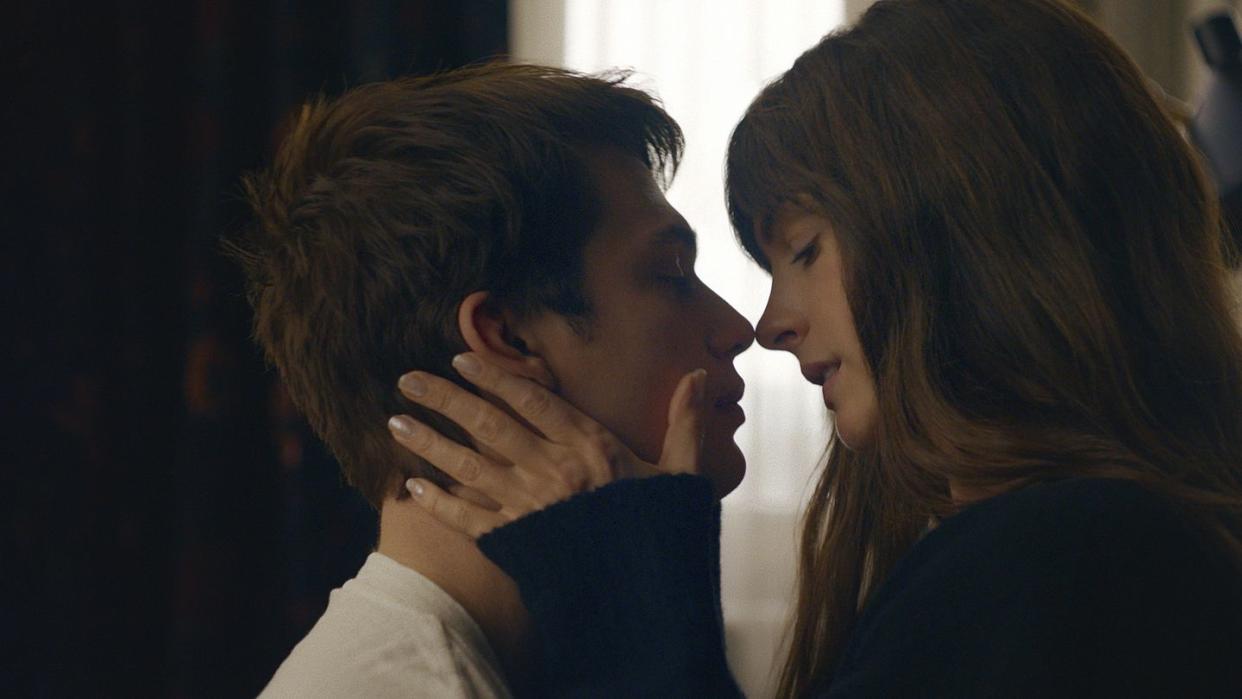How 'The Idea of You' Changes the Book’s Hotly Debated Ending

Spoilers ahead for The Idea of You, both the book and film adaptation.
The Idea of You author Robinne Lee “would’ve liked to have been involved” in the film adaptation of her 2017 novel—which follows the love affair between Solène Marchand, a 39-year-old art gallery owner, and a boyband frontman named Hayes Campbell—or so she told ELLE.com. “There were a lot of salient points of the story that did not make it into the adaptation,” she says. But it is perhaps her lack of involvement that best explains why the movie features a different ending than the book.
In the film, Solène (played by a dazzling Anne Hathaway) and Hayes (a capable, endearing Nicolas Galitzine) decide to end their romance after the widespread backlash begins to affect Solène’s daughter, Izzy (Ella Rubin), at school. But the Prime Video movie jumps forward in its final scenes, and depicts Hayes waltzing back into Solène’s gallery five years after their break-up. He’s eager to pick up where they once left off, especially now that they’re both older and Izzy’s in college. The argument here, of course, is that a 29-year-old Hayes romancing a 44-year-old woman is less controversial than a 24-year-old Hayes with a 39-year-old, and thus the risk of societal ostracism is lower.
I’m not sure how realistic this outcome would be in the actual celebrity industrial complex, which is likely why Lee’s book ends on such a contrasting note. In the novel, Hayes is 20, not yet of drinking age in America. (As in the movie, Solène is 39.) When Izzy’s classmates torture her on account of her mother’s relationship, Solène makes the executive decision to end it. She tells Hayes, “‘I can’t do this to Isabelle. I can’t do this to myself. I can’t follow you around the world. I’m not twenty. I have a career and I have a kid and I have responsibilities. And I have other people who need me.’”
The book ends with Hayes fighting for them to stay together, and Solène wounding him in a desperate bid to cut ties:
“You love me,” he said. “You loved me. You said you loved me. Why are you doing this?”
And I realized, then, that there was only one way to truly let him go. “Maybe it wasn’t you,” I said. “Maybe it was the idea of you.”
This gutting finale upset a number of Lee’s readers, particularly those under the impression that the book was a traditional romance novel. (In publishing, romances—at least those marketed as such—are expected to end with a so-called “HEA,” or Happily Ever After. This is largely considered a hard-and-fast rule of the genre, amongst both readers and industry professionals.) But Lee told ELLE.com she never intended for The Idea of You to be a true romance, but rather contemporary women’s fiction.
“I was really shocked when my publisher packaged it more as a romance,” Lee said, “and then readers who would come to me expecting that it was a romance wanted more, like, ‘Where’s my happy ending? And are you going to write a sequel?’” She continues, “I was like, ‘No, this is a one-off. It’s one story. Not every love story ends happily.’”
For that reason, amongst others, Lee considers the film (and its HEA) “a completely different entity” from the book. “I feel like my book is my baby, and this is its second cousin,” she said. “There’s some DNA, but not really.”
You Might Also Like


